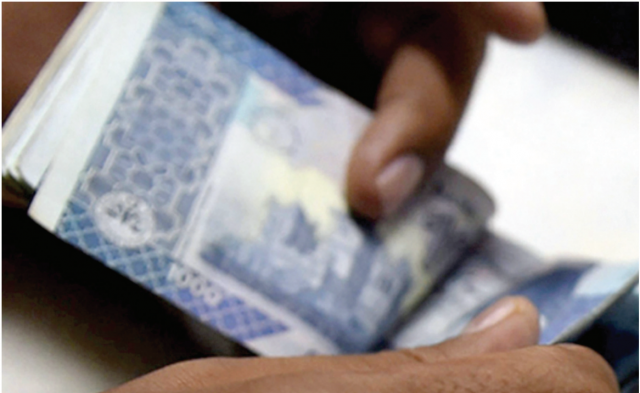Rs573m saved in PSX Sukuk auction
Govt sells Rs30b worth of bond to investors at rental payment of 19.52%

The government has saved Rs573 million in rental cost (cut-off yield) as it raised Rs30 billion in the maiden auction of one-year Ijarah Sukuk at the Pakistan Stock Exchange (PSX) at a fixed rental payment of 19.52%.
This rental cost is 1.91 percentage points lower than the 21.43% rate of return paid to investors, mostly by conventional banks, on the purchase of one-year conventional bonds, called T-bills, in an auction held by the State Bank of Pakistan (SBP) on November 29, 2023.
The rental payment on Ijarah Sukuk is also 91 basis points lower than the variable rental payment (floating rate of return) based Sukuk that Shariah-compliant banks bought at “T (T-bill) minus one percentage point” from the SBP last week, it has been learnt.
The Ijarah Sukuk auction has ended the monopoly of financial institutions in the bond market, as it facilitated the common man to directly bid for the Shariah-compliant bond with a minimum investment of Rs5,000.
PSX said in a notification on Saturday that investors bid for Sukuk at the rental payment ranging from 18.50% to 33.43%. The Ministry of Finance, however, raised the targeted amount of Rs30 billion at a rental coupon of 19.52%.
The stock market received bids of Rs396 billion from investors, oversubscribing the issue by 13 times. When compared with face value, it was oversubscribed by 16 times with investors offering Rs479 billion to buy the Sukuk.
The government has sold the Sukuk by keeping Islamabad Metro as the underlying asset.
There are also plans to auction conventional papers including T-bills and Pakistan Investment Bonds (PIBs) through the PSX in the near future and make auctions a regular feature at the bourse.
Talking to The Express Tribune, adviser to the issue Meezan Bank Senior Executive Vice President and Head of Shariah Compliance Ahmed Ali Siddiqui said the interest shown by a large number of investors having huge liquidity in hand helped the government acquire financing at a comparatively lower rental payment.
“It is a landmark achievement to raise investment through the stock market,” he remarked.
Read Potential for green, ESG Sukuk
Siddiqui hoped that the rental payment rate may come down further in future auctions, as more people became aware of being eligible to participate in auctions. PSX will float the next Sukuk in January 2024.
He stressed that the oversubscription by 13 times signaled that people had a big appetite for Shariah-compliant instruments.
He believes that the development of a Shariah-compliant capital market, which began with the auction of first Sukuk at the PSX, would help the government achieve its goal of integrating the conventional banking system into a Shariah-compliant network within the time frame ending in December 2027.
Govt to raise Rs6tr
In another development, the government has announced that it will raise Rs6 trillion in the auction of conventional and Shariah-compliant bonds like Sukuk, T-bills and PIBs over three months (December 2023 to February 2024) through the central bank.
It may utilise almost one-third of new debt for budgetary support as interest payments and pensions are the two biggest expenditures for the government these days.
It is also required to repay the maturing Rs3.77 trillion to banks during the three-month period, according to the auction calendar unveiled by the central bank.
The Ministry of Finance said in its monthly economic outlook for November 2023 that despite better fiscal accounts during the first quarter (Jul-Sept) of current fiscal year, “higher mark-up payments may put significant pressure on the expenditure side.”
“(The) mark-up payments experienced a substantial surge of 44.6%, primarily attributable to a higher policy rate (standing at a record high of 22% at present).”
The ministry added that expenditures for running the civil government and paying pensions remained the major contributors to stimulating the growth of non-mark-up spending, while expenditures on subsidies and grants to others recorded a substantial decline during the first quarter of the current fiscal year.
It is expected that effective fiscal management through a robust growth in revenues and a cautious expenditure approach will help navigate through potential challenges and maintain positive momentum in the fiscal sector, it said.
Total expenditures stood at Rs3,648.6 billion during the first quarter of FY2024 against Rs2,836.3 billion in the same period of last year, registering a growth of 28.6%.
Current expenditures grew 25% to reach Rs3,172.6 billion against Rs2,538.1 billion last year. Mark-up payments experienced a substantial surge of 44.6%, primarily attributable to a higher policy rate. Meanwhile, the growth in non-mark-up spending remained restricted to 13.2%.
Published in The Express Tribune, December 10th, 2023.
Like Business on Facebook, follow @TribuneBiz on Twitter to stay informed and join in the conversation.


















COMMENTS
Comments are moderated and generally will be posted if they are on-topic and not abusive.
For more information, please see our Comments FAQ